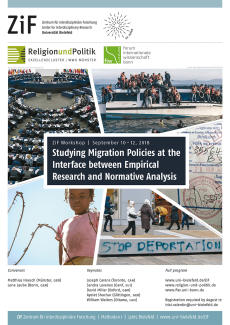„Studying Migration Policies“

In recent years, scholars of social sciences on the one hand and those of philosophy/political theory on the other hand dedicated a lot of work to the study of the phenomenon of migration and its regulation by states. However, the exchange between these two disciplines is insofar insufficient for at least two reasons. First, empirical endeavours into migration policies are most often linked to normative assumptions over the role of the state or their consequences for migrants and societies. If only these normative concerns were made explicit, the debate on research results could avoid the tedious polarization, which all too often prevents productive exchange among each other. Furthermore, using results of ethical discourse, scholars of empirical work could justifiably refer to ethical claims in order to motivate their studies or to highlight the ethical importance of their results ? if the political relevance of empirical migration studies should be emphasized, an ethical reflection seems to be unavoidable. Second, the philosophical debate usually unfolds without notice of the current questions and results of the corresponding empirical research. That way, philosophers stick to very general questions on the legitimacy to restrict access to a country under ideal conditions and miss the more concrete ethical questions on the ethical acceptability of actual migration politics that are implemented under complex conditions. With the international conference, we aim at the reflection of possible intersections between these two disciplines both studying migration and migration policies.

